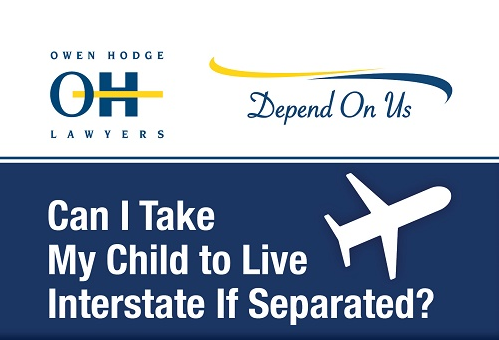

There are many reasons that may lead a divorced or separated parent to want to relocate – a new job, a new spouse, or a desire for the support of an extended family network. However, if the move will affect the child’s ability to spend time with the other parent, it may require that parent’s consent or Court Orders.
Basic Principles of Family Law
This may seem harsh toward the parent who provides most of the child’s care, but the basic principles of family law and the Family Law Act (1975) is fundamentally organized around the principle that a child should have the opportunity for a meaningful relationship with both parents. In a relocation situation, the child’s best interests would be more particularly determined through examination of several factors, including:
• The proposals for the other parent to spend time with the child;
• The existing relationship between the child and the parent with whom he or she lives;
• How much time children currently spend with the parent they do not live with, and what their relationship is like;
• The distance and permanence of the move;
• The impact it will have on the child’s friendships, extended family and school;
• The age and wishes of the child;
• The cost and ease of the other parent spending time with the child; and
• Other ways the child can continue to have a relationship with the other parent.
It may be helpful to think of the relocation question in three possible situations: where Court Orders already exist, when the other parent consents to the move, and when the other parent does not.
Where Parenting Order Already Exist

If parenting orders are in place which would permit the proposed relocation, you’re good to go. That is unlikely for any readers of this post, however. If the existing orders would prohibit the move or are ambiguous toward the intended move, you should seek legal advice immediately.
If you have parenting orders that provide for you to have equal shared parental responsibility with the other parent and you move without seeking the other person’s permission, you will likely be in breach of the order. A court may require you to return with the child until the matter has been resolved.

When the Other Parent Consents
Be cautious. Before you make your move, be sure to have a detailed written parenting plan in place or apply to the Family Court for consent order. This will protect your arrangement should the other parent reconsider.

When the Other Parent Refuses
You may ultimately be able to achieve an agreement through dispute resolution processes. If this fails, however, you can apply to a court for orders to allow you to move. The Court may or may not grant permission, in consideration of the factors described above. This is a situation in which the careful assistance of legal counsel is vitally important.
The family law solicitors at Owen Hodge Lawyers have a wealth of experience in negotiating relocation arrangements. If you have questions about an upcoming interstate move with your children or about the relocation of your children with your former spouse, please call us at your earliest convenience to schedule a consultation at 1800 770 780.
